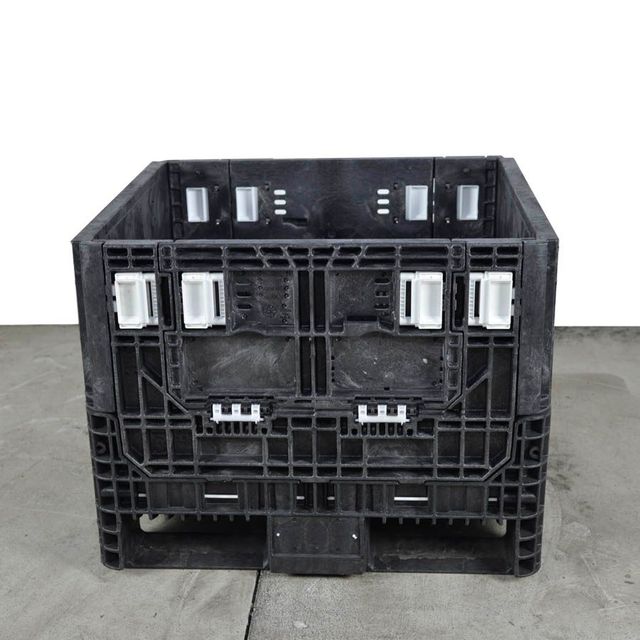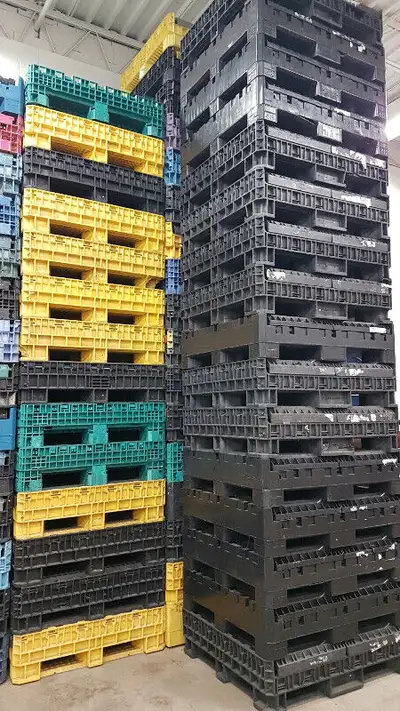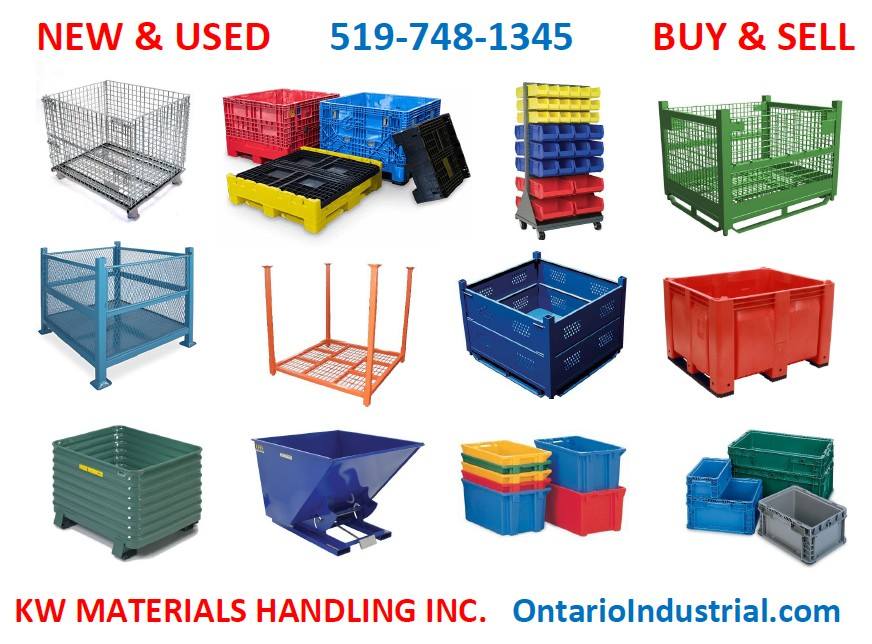Why Mass Containers Are Essential for Economical and sustainable Transport
Bulk containers play a crucial duty in modern-day logistics. They facilitate the reliable motion of large amounts of goods, therefore enhancing transportation procedures. This method not only reduces costs however also decreases environmental impact via lower exhausts and waste generation. As industries look for even more lasting techniques, the fostering of mass containers is becoming progressively significant. What ramifications does this shift hold for future logistics and supply chain monitoring?

The Benefits of Using Mass Containers in Logistics
Mass containers revolutionize logistics by enhancing effectiveness and sustainability. These containers permit the transport of large amounts of goods in a solitary journey, noticeably reducing the variety of journeys required. This not just improves procedures yet also minimizes labor costs linked with handling, filling, and unloading. On top of that, mass containers are created to optimize area utilization within transportation automobiles, making certain that more products can be delivered at the same time.
The standardization of mass containers also streamlines the logistics procedure. With consistent dimensions, they can be quickly stacked and kept, causing boosted storage facility monitoring. In addition, mass containers commonly feature resilient products that protect materials from damage throughout transit, thus decreasing item loss and increasing total dependability. As an outcome, organizations can experience enhanced supply chain performance, inevitably leading to increased earnings and consumer complete satisfaction. This combination of variables makes bulk containers a vital property in modern-day logistics.
Environmental Effect: Decreasing Waste and Carbon Impact
As sectors progressively prioritize sustainability, the fostering of bulk containers has become a key method for lowering waste and decreasing carbon footprints. These containers reduce the usage of product packaging materials, such as boxes and plastic, consequently notably reducing general waste generation. By combining deliveries, bulk containers boost transportation efficiency, permitting even more products to be moved per journey. This reduction in journeys directly correlates with reduced greenhouse gas discharges, adding to a smaller sized carbon footprint.
Furthermore, bulk containers can frequently be recycled or recycled, better mitigating ecological effect. The toughness of these containers assurances they can withstand several transport cycles, decreasing the need for single-use options. used bulk containers. By improving logistics and promoting effective source use, mass containers not just support lasting techniques however additionally urge markets to line up with international environmental goals. Inevitably, their application mirrors a commitment to eco-friendly stewardship and accountable source monitoring
Expense Financial Savings: How Bulk Containers Lower Transport Costs
While many companies look for means to enhance their bottom line, making use of bulk containers presents a significant possibility for reducing transportation expenses. Bulk containers maximize the quantity of goods carried, allowing businesses to ship larger amounts at the same time. This efficiency minimizes the number of journeys needed, directly lowering fuel prices and minimizing labor expenditures related to loading and unloading.
Additionally, bulk containers typically feature structured styles that optimize area use within transportation automobiles. This means fewer voids, resulting in more efficient usage of available capability. The toughness of mass containers can lower the threat of product damages throughout transit, lowering losses and guaranteeing that more products get here undamaged.
Enhancing Supply Chain Efficiency With Bulk Storage Solutions
Bulk storage space solutions play a crucial role in enhancing supply chain efficiency by maximizing stock management. By combining products right into fewer, bigger containers, businesses can considerably reduce handling costs connected with frequent transfers and handling. This streamlined technique allows for far better tracking and monitoring of supply, eventually bring about enhanced functional performance.
Streamlined Stock Management
Efficient inventory management is essential for maximizing supply chain operations, particularly when organizations adopt bulk storage remedies. These services make it possible for organizations to preserve higher stock degrees while reducing the regularity of replenishment. By settling materials right into bulk containers, companies can improve their inventory procedures, minimizing the intricacy connected with tracking numerous smaller sized plans. This technique facilitates accurate inventory counts and enhances projecting accuracy, enabling more enlightened decision-making. On top of that, mass storage options simplify storehouse organization, making it much easier to find and access items when required. As an outcome, organizations can achieve a more reliable inventory turnover rate, inevitably boosting total supply chain performance and reducing the probability of stockouts or overstock situations.

Lowered Handling Prices
The application of bulk storage solutions not only simplifies inventory management yet also significantly reduces handling costs across the supply chain. By consolidating products into bulk containers, firms decrease the requirement for frequent handling and transfer between various storage space and transportation devices. This method minimizes labor prices connected with loading, discharging, and moving smaller bundles. Additionally, bulk storage space decreases the regularity of shipments, causing lower transport expenses and reduced fuel consumption. As an outcome, companies can maximize their logistics operations, permitting a more effective allocation of resources. Eventually, minimized dealing with prices add to improved overall supply chain efficiency, fostering a setting that sustains both sustainability and financial feasibility.

Flexibility of Mass Containers Throughout Numerous Industries
Although several sectors have unique needs for transportation and storage, mass containers have become a flexible solution that satisfies a wide variety of needs. These containers, varying from big containers to specialized tanks, can fit varied materials, including powders, liquids, and granules. In the farming field, here bulk containers promote the transport of grains and fertilizers, while the food and beverage sector uses them for components and finished items. The chemical sector depends on bulk containers for securely transporting unsafe products, making sure compliance with security policies. Furthermore, construction companies profit from mass containers for transporting aggregates and various other materials. Their adaptability encompasses numerous modes of transportation, consisting of trucks, ships, and trains, enhancing logistical effectiveness. This flexibility not only simplifies procedures across various fields yet likewise promotes sustainability by lowering product packaging waste and optimizing room en route. Consequently, mass containers play a crucial duty in modern supply chain administration.
Future Patterns wholesale Container Usage and Sustainability
The future of mass container use is progressively formed by ingenious materials advancement that boosts sustainability. Furthermore, automation in logistics assures to simplify procedures, decreasing waste and improving effectiveness. Welcoming circular economic situation methods will additionally transform just how bulk containers are made, used, and recycled, fostering an extra sustainable transportation landscape.
Innovative Products Growth
As sectors progressively prioritize sustainability, cutting-edge products development in bulk containers becomes a considerable element in improving green transport solutions. Researchers and producers are exploring eco-friendly plastics, recycled compounds, and light-weight steels to reduce environmental influence. These materials not just minimize waste yet also improve gas effectiveness by lowering the general weight of containers. In addition, developments in wise products, which can adjust to differing problems, enhance the longevity and functionality of bulk containers. The combination of these innovative materials lines up with round economic climate concepts, advertising reuse and recycling. As the demand for sustainable methods expands, the growth of such materials will play a vital duty fit the future of bulk container usage in logistics and transportation.
Automation in Logistics
Considerable innovations in automation are poised to transform logistics and the utilization of bulk containers, boosting sustainability in transport. Automated systems, consisting of drones and independent automobiles, are simplifying the movement of mass containers, minimizing the dependence on conventional fuel-powered transport. These innovations optimize routing and packing procedures, reducing empty miles and boosting fuel efficiency. Additionally, automated supply administration systems improve tracking and tracking of mass containers, guaranteeing better source appropriation and reduced waste. The integration of the Internet of Points (IoT) allows real-time data evaluation, allowing proactive decision-making that aligns with sustainability goals. As automation continues to advance, it is anticipated to drive further technologies in mass container usage, inevitably supporting even more lasting logistics techniques and decreasing the ecological influence of transport.
Round Economy Practices
Innovations in automation are setting the stage for a more incorporated strategy to round economic climate practices in the domain of mass container use. As industries significantly welcome sustainability, mass containers are being made for durability and reusability. This shift not only reduces waste yet likewise enhances resource performance. Business are taking on techniques such as closed-loop systems, where utilized containers are accumulated, refurbished, and reestablished right into the supply chain. Furthermore, wise modern technologies track container life cycles, promoting much better management and lowering environmental influence. The partnership in between producers, logistics carriers, and end-users is crucial in establishing requirements for sustainable container usage. used bulk containers. Future patterns indicate a growing focus on materials that are recyclable and naturally degradable, more strengthening the circular economy's principles in bulk transportation

Regularly Asked Inquiries
What Materials Are Bulk Containers Normally Made From?
Bulk containers are generally constructed from sturdy products such as high-density polyethylene, steel, light weight aluminum, and cardboard. These materials offer security, strength, and convenience, making them suitable for carrying various products in various industries effectively.
How Do I Pick the Right Size Bulk Container?
Picking the best size bulk container entails reviewing the quantity of materials to be transported, taking into consideration handling equipment compatibility, and appraising storage room requirements. Proper dimension guarantees efficiency in transport and decreases waste throughout shipment.
Are Bulk Containers Reusable or Recyclable?
Bulk containers are usually multiple-use, made for numerous trips, enhancing sustainability. Several can likewise be recycled, depending on the materials made use of. Picking recyclable options additionally minimizes and supports environmental goals waste in transportation practices.
What Security Laws Apply to Mass Container Transport?
Safety regulations for mass container transport consist of compliance with the Department of Transportation standards, proper labeling of dangerous materials, architectural integrity assessments, and adherence to weight limitations to ensure secure handling and avoid crashes throughout transit.
Exactly How Can Businesses Shift to Utilizing Mass Containers Effectively?
Organizations can change to bulk containers by examining existing logistics, training personnel on handling, investing in ideal equipment, optimizing supply administration, and working together with suppliers to assure compatibility and efficiency throughout the supply chain.
As sectors increasingly focus on sustainability, the adoption of bulk containers has actually emerged as an essential approach for reducing waste and reducing carbon impacts. By consolidating materials into bulk containers, companies can improve their stock procedures, reducing the intricacy connected with tracking numerous smaller sized plans. As industries increasingly prioritize sustainability, innovative products growth in mass containers arises as a substantial aspect in boosting environmentally friendly transportation options. Automated systems, consisting of drones and independent cars, are enhancing the activity of mass containers, lowering the dependence on typical fuel-powered transport. In addition, automated inventory administration systems improve monitoring and tracking of mass containers, ensuring far better resource allotment and reduced waste.